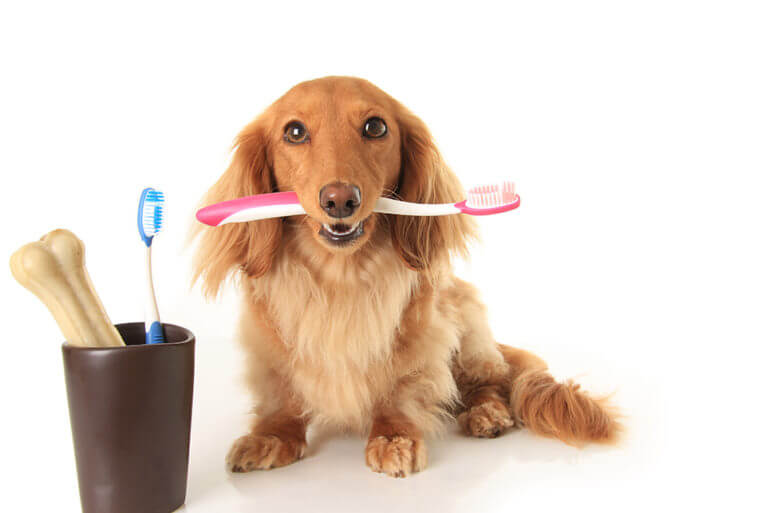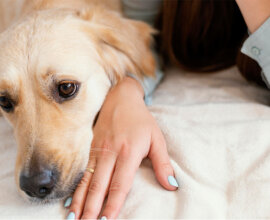How to Improve Your Dog’s Bad Breath
I love how affectionate my dog can be; he always wants to cuddle up close. However, there was just one small problem. His stinky breath!
I decided to do some research and ask the vet what we could do to help him with his bad breath. We discovered many potential avenues on combating the smell, which I will share below for those who are currently finding themselves in the same situation!
1. Ask Your Professional Groomer to Brush Their Teeth
A major cause of bad breath within dogs is poor dental health. Therefore, one of the best things you can do to get rid of that stink is to brush their teeth regularly, at least two to three times a week. Supplement this with a professional teeth cleaning from Groomit for great results!
2. Rawhide Bones
These bones can help reduce your dog’s bad breath by lowering plaque, improving their dental health at the same time. However, rawhide bones aren’t a great fit for every dog. We’d only recommend this option for breeds who are softer chewers, as it is easy for strong chewers to break these bones into fragments, which may pose a health risk if ingested. Ensure that you choose the correct kind of bone for your dog’s size too!
3. Cinnamon
Yes, cinnamon! Cinnamon can help break up food particles in their teeth, removing the smell. A small sprinkle within their meals can help for temporary cases of bad breath.
4. Parsley
My grandma used to say that parsley can help freshen your breath. Turns out, it can do the same for your dogs! Dog treats that contain parsley can help, or you can sprinkle small quantities onto your dog’s meal. Be sure to not give too much, as parsley can cause skin conditions if ingested in large amounts.
5. Coconut Oil
There is so much buzz these days about the benefits of coconut oil, not only for cooking, the skin, but also for our beloved pets. It’s a common pantry item and it can have a multitude of benefits, including fresher breath.
When Does Bad Breath Become a Concern?
If your dog’s bad breath persists, it is recommended above all else to get them checked out by a veterinarian. Bad breath can be a symptom of dental disease, kidney problems, or even diabetes. Treating the root cause will help clear up the bad breath.
As mentioned before, the best thing you can do to prevent breath problems is to look after your dog’s teeth properly. We at Groomit are always willing to help with this; our expert groomers are just a few clicks away! Schedule an appointment if you are concerned with your dog’s breath and teeth.
FAQ’s
Q: How can I improve my dog’s breath?
A: Improving your dog’s breath is possible with a few simple steps. Firstly, establish a regular dental care routine for your dog, including brushing their teeth. Use a dog-specific toothbrush and toothpaste to remove plaque and freshen their breath. Additionally, provide your dog with dental chews or toys designed to promote oral health. Feeding them high-quality dog food and avoiding table scraps can also help prevent bad breath. If the problem persists, consult with your veterinarian to rule out any underlying dental or health issues.
Q: Can certain foods or treats help freshen my dog’s breath?
A: Yes, some foods and treats can contribute to fresher breath for your dog. Crunchy treats or dental chews specifically designed to improve dental health can help remove plaque and tartar buildup, reducing bad breath. Additionally, certain fresh fruits and vegetables, such as apples or carrots, can act as natural breath fresheners for dogs. However, it’s essential to consult with your veterinarian before introducing any new foods or treats into your dog’s diet to ensure they are safe and suitable for your pet.
Q: How often should I brush my dog’s teeth to maintain good oral hygiene?
A: To maintain good oral hygiene for your dog, it’s recommended to brush their teeth at least two to three times per week. Regular brushing helps remove plaque and prevents the buildup of tartar, which can contribute to bad breath and dental issues. Establishing a consistent brushing routine from an early age can help your dog become accustomed to the process. However, it’s important to use toothpaste and toothbrushes specifically designed for dogs, as human toothpaste can be harmful to them.
Q: Are there any signs that indicate my dog may have dental problems causing bad breath?
A: Yes, there are signs that may indicate your dog has dental problems contributing to bad breath. These signs include persistent bad breath, red or swollen gums, bleeding gums, loose or missing teeth, difficulty eating or chewing, pawing at the mouth, or reluctance to have their mouth touched. If you notice any of these signs, it’s crucial to consult with your veterinarian. They can perform a dental examination and recommend appropriate treatment, such as a professional cleaning or addressing any dental issues that may be causing the bad breath.
Q: Can professional dental cleanings help improve my dog’s breath?
A: Yes, professional dental cleanings can significantly improve your dog’s breath and overall oral health. Veterinarians and professional groomers are trained to perform thorough cleanings, including scaling the teeth to remove plaque and tartar buildup. They may also perform a complete oral examination to identify any underlying dental issues. Professional cleanings are typically done under anesthesia to ensure your dog’s comfort and safety. Regular professional cleanings, along with a home dental care routine, can help maintain fresh breath and prevent dental problems in your dog.
Q: Are there any natural remedies or supplements that can help freshen my dog’s breath?
A: There are some natural remedies and supplements that may help freshen your dog’s breath. Some pet owners find that adding a small amount of fresh parsley to their dog’s food can help combat bad breath naturally. Additionally, certain water additives or breath freshening sprays formulated for dogs can be used as supplements to improve breath odor. However, it’s important to consult with your veterinarian before using any natural remedies or supplements to ensure they are safe and suitable for your dog.






